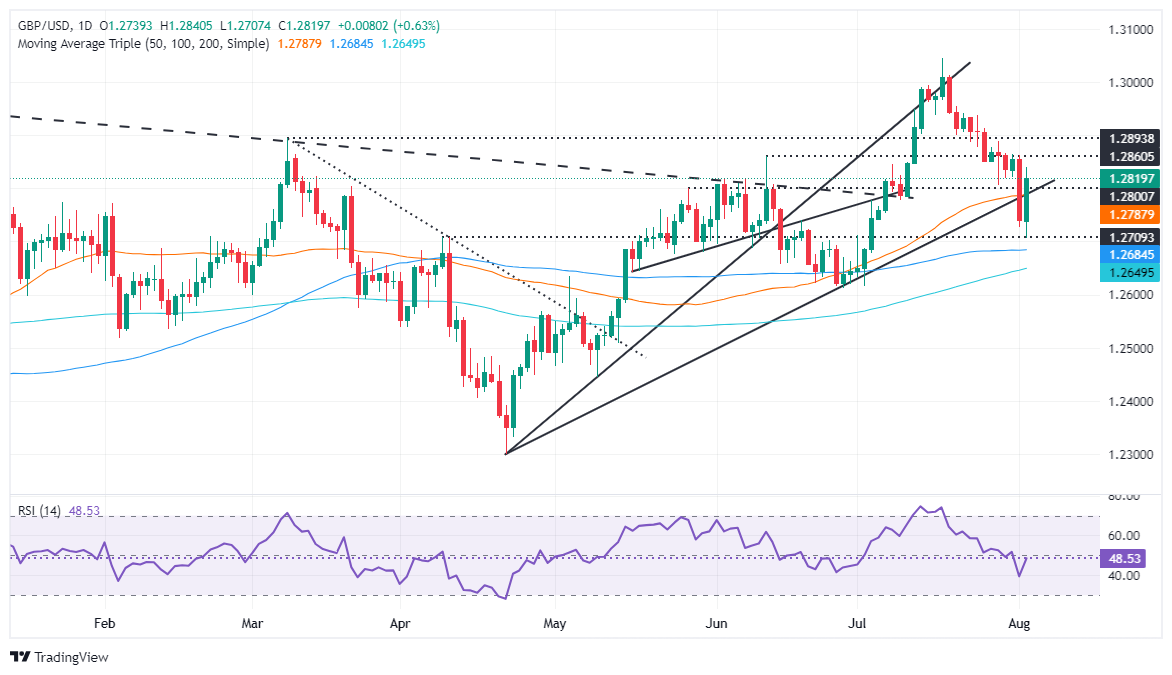GBP/USD Price Analysis: Rises above 1.2800 amid weak US data fueling rate cut hopes

- GBP/USD rallies from daily low of 1.2707 to trade above the 1.2800 mark.
- Key resistance levels reclaimed: 50-DMA at 1.2787 and 1.2800 mark; next targets are 1.2860, 1.2900, and 1.2950.
- If GBP/USD falls below 1.2800, it may range between 1.2800 and 1.2700, with further support at 100-DMA (1.2683).
The Pound Sterling rallied sharply against the US Dollar after recent economic data from the United States (US) sparked speculation that the US Federal Reserve might cut interest rates faster than expected. The GBP/USD trades at 1.2833 after hitting a daily low of 1.2707.
The Greenback is being battered, given the backdrop of the July ISM Manufacturing PMI plunging to its lowest level since December 2023 and Nonfarm Payrolls missing the mark. Market participants had begun to price in a larger rate cut at the upcoming September meeting.
GBP/USD Price Analysis: Technical outlook
After diving throughout the week, the GBP/USD reclaimed key resistance levels like the 50-day moving average (DMA) at 1.2787 and the 1.2800 mark. Momentum shifted in buyers’ favor as the Relative Strength Index (RSI) turned bullish
If GBP/USD closes above 1.2800, that can pave the way for testing the June 12 high at 1.2860 and expose the 1.2900 psychological figure. Once surpassed, further upside is seen, with the next stop being 1.2950, which capped price action for four consecutive days before buyers could challenge 1.3000.
Conversely, if sellers drag the GBP/USD pair below 1.2800, then the pair could stay range-bound within the 1.2800-1.2700 mark, which, if broken, will expose the 100-DMA at 1.2683.
GBP/USD Price Action – Daily Chart
Pound Sterling FAQs
The Pound Sterling (GBP) is the oldest currency in the world (886 AD) and the official currency of the United Kingdom. It is the fourth most traded unit for foreign exchange (FX) in the world, accounting for 12% of all transactions, averaging $630 billion a day, according to 2022 data. Its key trading pairs are GBP/USD, aka ‘Cable’, which accounts for 11% of FX, GBP/JPY, or the ‘Dragon’ as it is known by traders (3%), and EUR/GBP (2%). The Pound Sterling is issued by the Bank of England (BoE).
The single most important factor influencing the value of the Pound Sterling is monetary policy decided by the Bank of England. The BoE bases its decisions on whether it has achieved its primary goal of “price stability” – a steady inflation rate of around 2%. Its primary tool for achieving this is the adjustment of interest rates. When inflation is too high, the BoE will try to rein it in by raising interest rates, making it more expensive for people and businesses to access credit. This is generally positive for GBP, as higher interest rates make the UK a more attractive place for global investors to park their money. When inflation falls too low it is a sign economic growth is slowing. In this scenario, the BoE will consider lowering interest rates to cheapen credit so businesses will borrow more to invest in growth-generating projects.
Data releases gauge the health of the economy and can impact the value of the Pound Sterling. Indicators such as GDP, Manufacturing and Services PMIs, and employment can all influence the direction of the GBP. A strong economy is good for Sterling. Not only does it attract more foreign investment but it may encourage the BoE to put up interest rates, which will directly strengthen GBP. Otherwise, if economic data is weak, the Pound Sterling is likely to fall.
Another significant data release for the Pound Sterling is the Trade Balance. This indicator measures the difference between what a country earns from its exports and what it spends on imports over a given period. If a country produces highly sought-after exports, its currency will benefit purely from the extra demand created from foreign buyers seeking to purchase these goods. Therefore, a positive net Trade Balance strengthens a currency and vice versa for a negative balance.
Information on these pages contains forward-looking statements that involve risks and uncertainties. Markets and instruments profiled on this page are for informational purposes only and should not in any way come across as a recommendation to buy or sell in these assets. You should do your own thorough research before making any investment decisions. FXStreet does not in any way guarantee that this information is free from mistakes, errors, or material misstatements. It also does not guarantee that this information is of a timely nature. Investing in Open Markets involves a great deal of risk, including the loss of all or a portion of your investment, as well as emotional distress. All risks, losses and costs associated with investing, including total loss of principal, are your responsibility. The views and opinions expressed in this article are those of the authors and do not necessarily reflect the official policy or position of FXStreet nor its advertisers. The author will not be held responsible for information that is found at the end of links posted on this page.
If not otherwise explicitly mentioned in the body of the article, at the time of writing, the author has no position in any stock mentioned in this article and no business relationship with any company mentioned. The author has not received compensation for writing this article, other than from FXStreet.
FXStreet and the author do not provide personalized recommendations. The author makes no representations as to the accuracy, completeness, or suitability of this information. FXStreet and the author will not be liable for any errors, omissions or any losses, injuries or damages arising from this information and its display or use. Errors and omissions excepted.
The author and FXStreet are not registered investment advisors and nothing in this article is intended to be investment advice.




